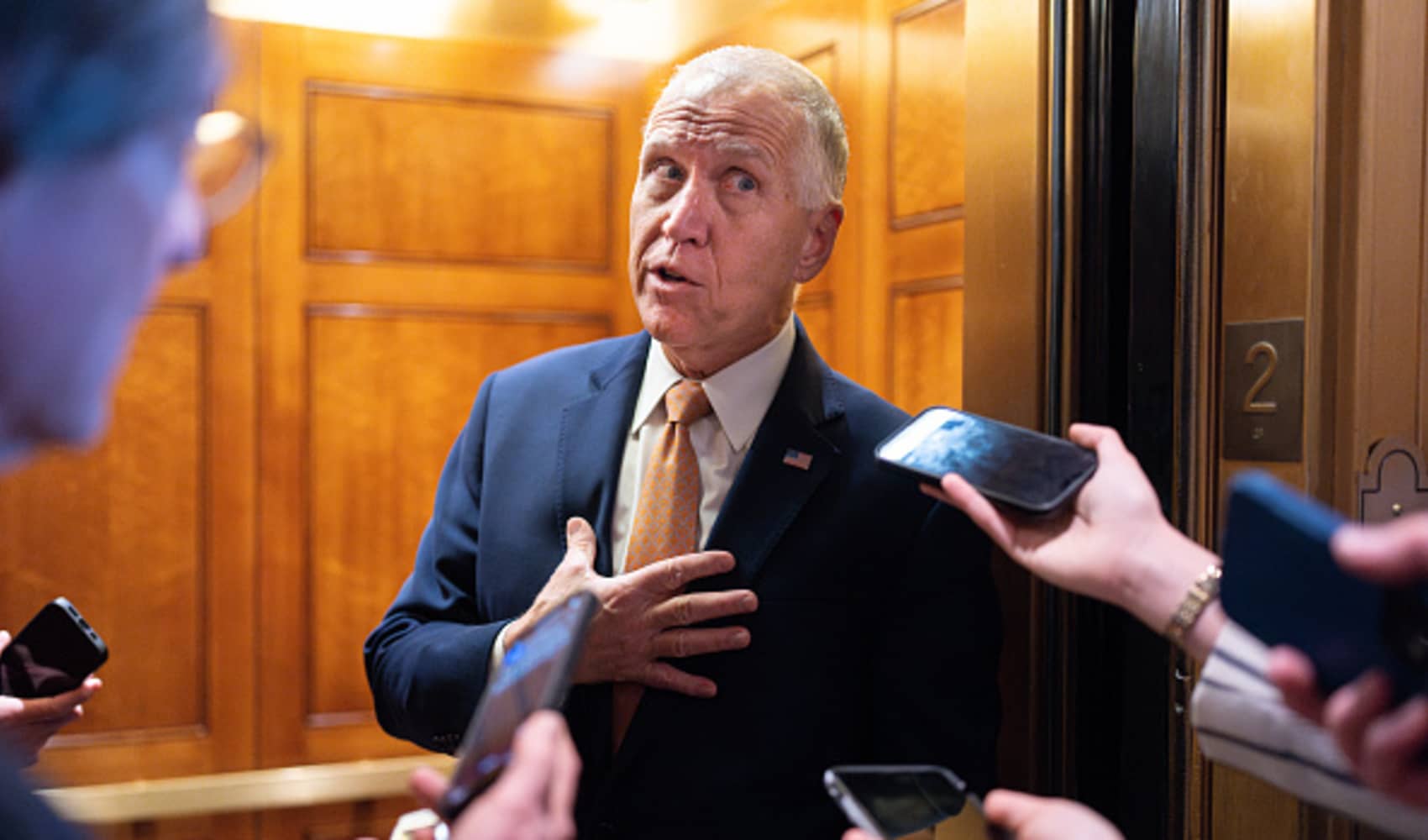Trump's DC Pick Doomed? Republican Revolt Over Jan 6!
Trump's DC Prosecutor Pick Crumbles: Republican Revolt!
Introduction: A Nomination in Peril
In the high-stakes world of Washington politics, nominations for key positions often become battlegrounds. And when former President Donald Trump throws his hat in the ring with a controversial pick, you can bet the fur is going to fly. This time, it's Ed Martin, Trump's choice for U.S. Attorney for the District of Columbia. But hold on – it seems even some Republicans are having second thoughts. Could this nomination be dead on arrival? Let's dive in.
Sen. Tillis's Bombshell Announcement
A major blow was dealt to Martin's chances on Tuesday when Sen. Thom Tillis of North Carolina publicly stated he would not support the nomination. This is a big deal. Why? Because in the Senate, every vote counts, especially when dealing with potentially contentious nominations.
The Importance of Senate Confirmation
Remember, these appointments aren't just rubber-stamped. The Senate has to confirm them. This means a nominee needs a majority vote. Losing the support of a key Republican like Tillis significantly narrows Martin's path to confirmation. Think of it like a game of chess; losing a powerful piece early on can seriously weaken your position.
Jan. 6th: The Elephant in the Room
So, what's the reason for Tillis's opposition? It all boils down to the January 6th Capitol riot. Tillis specifically cited Martin's previous support for criminal defendants involved in those cases. This is where things get sticky.
Why Jan. 6th Matters
The January 6th attack was a pivotal moment in American history. It was a day of violence and chaos, and the legal consequences are still unfolding. Supporting those accused of participating in the riot is a highly sensitive issue, especially for those in positions of power.
Trump's Pardons: Adding Fuel to the Fire
Now, let's throw another log onto the fire. The report mentioned Trump's intention to issue blanket pardons to January 6th defendants on his first day back in the White House. This promise of potential pardons further complicates the situation.
The Controversy of Pardons
Presidential pardons are a powerful tool, but they're often surrounded by controversy. Granting blanket pardons to individuals involved in the January 6th riot would likely be seen as highly divisive, even by some within Trump's own party. Is it possible to support the prosecution of these people, but also advocate for clemency down the road? It's a question with no easy answer.
The Role of the DC U.S. Attorney
Why is this particular U.S. Attorney position so important? Well, the U.S. Attorney for the District of Columbia oversees a massive caseload, including many high-profile cases. They are essentially the top prosecutor in the nation's capital.
The Significance of the DC Office
Given the proximity to the federal government, the DC U.S. Attorney's office deals with a wide range of issues, from political corruption to national security matters. It's a position that requires someone with impeccable judgment and a deep understanding of the law.
Martin's Track Record: A Closer Look
What do we know about Ed Martin? What is it about his track record that's raising red flags? Has he previously expressed views on Jan. 6th cases? It's crucial to understand his background and previous statements to fully grasp the opposition to his nomination.
The Importance of Due Diligence
Any nominee for a high-profile position should be thoroughly vetted. This means examining their past writings, speeches, and legal work. The Senate has a responsibility to ensure that anyone appointed to such a position is qualified and impartial.
The Republican Divide: A Party at Odds?
Tillis's opposition highlights a potential divide within the Republican party. While some Republicans may be eager to support Trump's picks, others are clearly hesitant, particularly when it comes to issues related to January 6th. This division could have significant implications for future nominations.
The Future of Republican Unity
Can the Republican party bridge this divide? Will other Republican senators follow Tillis's lead and oppose Martin's nomination? The answers to these questions will reveal a lot about the party's future direction.
The Democrats' Perspective: Waiting in the Wings
While the Republican party is grappling with this internal conflict, the Democrats are likely watching closely. Will they seize this opportunity to oppose Martin's nomination? Their stance could ultimately determine the outcome.
The Power of the Opposition Party
In the Senate, the opposition party has the power to block nominations. If the Democrats unite against Martin, his chances of confirmation become even slimmer. It's a game of political maneuvering, and the stakes are high.
The Impact on the Justice Department
This nomination fight has broader implications for the Department of Justice. Uncertainty at the top of the DC U.S. Attorney's office can create instability and disrupt ongoing investigations. A swift resolution is crucial for the department's effectiveness.
Ensuring Stability and Efficiency
The Department of Justice plays a vital role in upholding the rule of law. Any disruption to its leadership can have serious consequences. It's important to ensure that the DC U.S. Attorney's office is led by a qualified and stable individual.
Alternative Candidates: Who Else is in the Running?
If Martin's nomination ultimately fails, who else might Trump consider for the position? Are there other candidates with similar qualifications but less controversial records? Exploring alternative options is a prudent move at this stage.
Weighing the Options
Choosing the right person for this role is crucial. Trump needs to carefully consider all the available options and select someone who can unite, rather than divide.
The Senate's Role: A Check on Power
The Senate's role in confirming presidential appointments is a critical check on power. It ensures that the executive branch doesn't have unchecked authority. This process is essential for maintaining a balance of power in government.
Preserving Checks and Balances
The Constitution established a system of checks and balances to prevent any one branch of government from becoming too powerful. The Senate's confirmation power is a key element of this system.
The Political Fallout: What's Next?
What will be the political fallout from this nomination battle? Will it further erode Trump's standing within the Republican party? Will it embolden other Republicans to stand up to him? The answers to these questions remain to be seen.
The Uncertain Future
The political landscape is constantly shifting. This nomination fight is just one piece of a larger puzzle. The coming weeks and months will be crucial in determining the future of American politics.
Conclusion: A Nomination on the Brink
The nomination of Ed Martin for U.S. Attorney for the District of Columbia is facing significant challenges. Sen. Tillis's opposition, coupled with concerns about Martin's views on January 6th defendants, has put the nomination in serious jeopardy. The outcome of this battle will have far-reaching implications for the Department of Justice, the Republican party, and the future of American politics. The question is: can Martin salvage this nomination, or is it destined to fail?
Frequently Asked Questions
Q1: Why is the U.S. Attorney for the District of Columbia such an important position?
The U.S. Attorney for D.C. oversees a high volume of cases, including many involving the federal government and national security, making it a crucial role in the justice system.
Q2: What specific concerns did Sen. Tillis raise about Ed Martin?
Sen. Tillis cited Martin's past support for defendants involved in the January 6th Capitol riot cases as a primary reason for his opposition.
Q3: How do presidential pardons factor into this controversy?
Trump's promise of potential blanket pardons for January 6th defendants adds another layer of complexity, raising questions about justice and accountability.
Q4: What happens if Ed Martin's nomination fails?
If Martin's nomination fails, President Trump will need to nominate a different candidate for the position, potentially opening the door to someone less controversial.
Q5: How could this nomination battle affect the Republican party?
This controversy highlights divisions within the Republican party regarding Trump's influence and the handling of the January 6th events, potentially impacting future political strategies and alliances.


